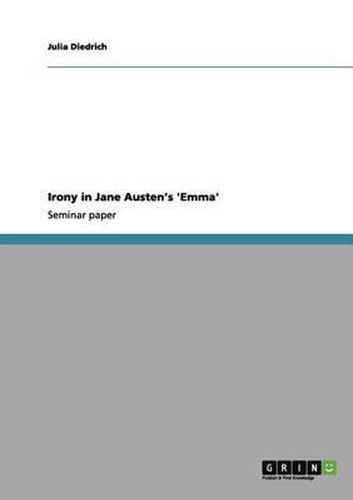Readings Newsletter
Become a Readings Member to make your shopping experience even easier.
Sign in or sign up for free!
You’re not far away from qualifying for FREE standard shipping within Australia
You’ve qualified for FREE standard shipping within Australia
The cart is loading…






Seminar paper from the year 2008 in the subject English Language and Literature Studies - Literature, grade: 1,0, Ernst Moritz Arndt University of Greifswald, course: Jane Austen’s Emma, language: English, abstract: Many critics still regard Jane Austen as one of the most popular and enduring English writers of all time (Byrne 20). Throughout the literary world, she is renowned for her skills in novel writing (cf. Trickett 162). Among other qualities, Austen has particularly been acknowledged for being a dazzling satirist of snobbery and elitism (Byrne 2). Concerning her novels, Emma, being published in 1816, is nowadays seen as Austen’s greatest achievement (cf. Mansell 146). Even early critics acknowledged that the special nature of this novel in comparison to what she had written before (cf. Byrne 32). According to Odmark, Emma particularly reflects how Austen successfully established and further developed methods of writing used in her earlier novels (cf. Odmark 24). The success of Emma can also be seen in the fact that it was the first of Austen’s novels which was reviewed by a famous author of her time, Sir Walter Scott (1771-1832) (cf. Byrne 32). Scott particularly pointed to the naturalness and pervasive realism Austen employed in Emma (Trickett 163). However, he also claimed that this novel had not much of a story in the traditional narrative sense (cf. Trickett 168). While the climax of a story is normally reached through a number of incidents and adventures, Austen’s Emma does not present such features (cf. Trickett 168). What is most important about this novel was summed up by the novelist Thomas Henry Lister, who praised Austen for her rare and difficult art of making her readers intimately acquainted with the characters of her novel (qtd. in Trickett 165). He moreover stated that Austen’s novel provides the feeling of having literally lived among these characters; and yet she employs no elaborate description - no metaphysical analysis - no a
$9.00 standard shipping within Australia
FREE standard shipping within Australia for orders over $100.00
Express & International shipping calculated at checkout
Seminar paper from the year 2008 in the subject English Language and Literature Studies - Literature, grade: 1,0, Ernst Moritz Arndt University of Greifswald, course: Jane Austen’s Emma, language: English, abstract: Many critics still regard Jane Austen as one of the most popular and enduring English writers of all time (Byrne 20). Throughout the literary world, she is renowned for her skills in novel writing (cf. Trickett 162). Among other qualities, Austen has particularly been acknowledged for being a dazzling satirist of snobbery and elitism (Byrne 2). Concerning her novels, Emma, being published in 1816, is nowadays seen as Austen’s greatest achievement (cf. Mansell 146). Even early critics acknowledged that the special nature of this novel in comparison to what she had written before (cf. Byrne 32). According to Odmark, Emma particularly reflects how Austen successfully established and further developed methods of writing used in her earlier novels (cf. Odmark 24). The success of Emma can also be seen in the fact that it was the first of Austen’s novels which was reviewed by a famous author of her time, Sir Walter Scott (1771-1832) (cf. Byrne 32). Scott particularly pointed to the naturalness and pervasive realism Austen employed in Emma (Trickett 163). However, he also claimed that this novel had not much of a story in the traditional narrative sense (cf. Trickett 168). While the climax of a story is normally reached through a number of incidents and adventures, Austen’s Emma does not present such features (cf. Trickett 168). What is most important about this novel was summed up by the novelist Thomas Henry Lister, who praised Austen for her rare and difficult art of making her readers intimately acquainted with the characters of her novel (qtd. in Trickett 165). He moreover stated that Austen’s novel provides the feeling of having literally lived among these characters; and yet she employs no elaborate description - no metaphysical analysis - no a